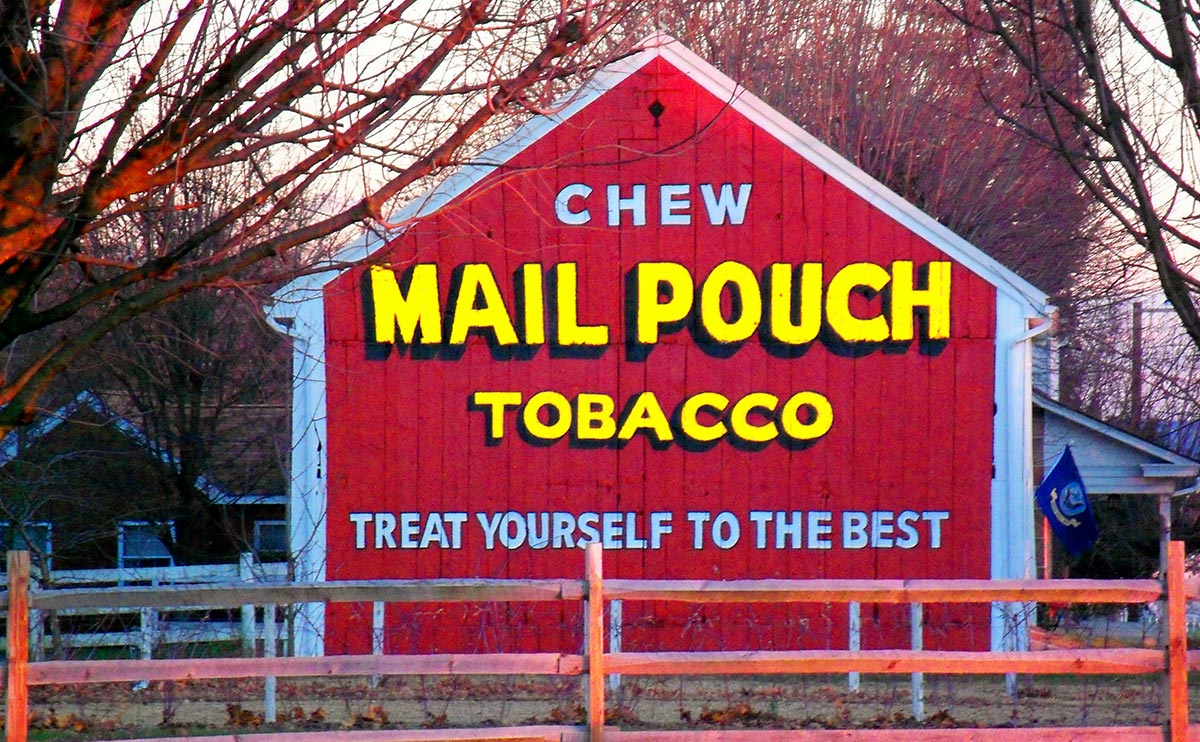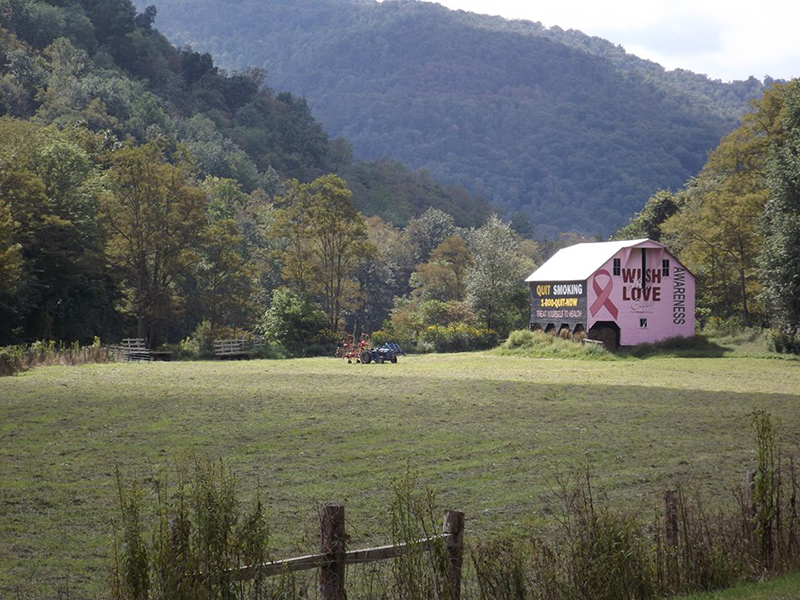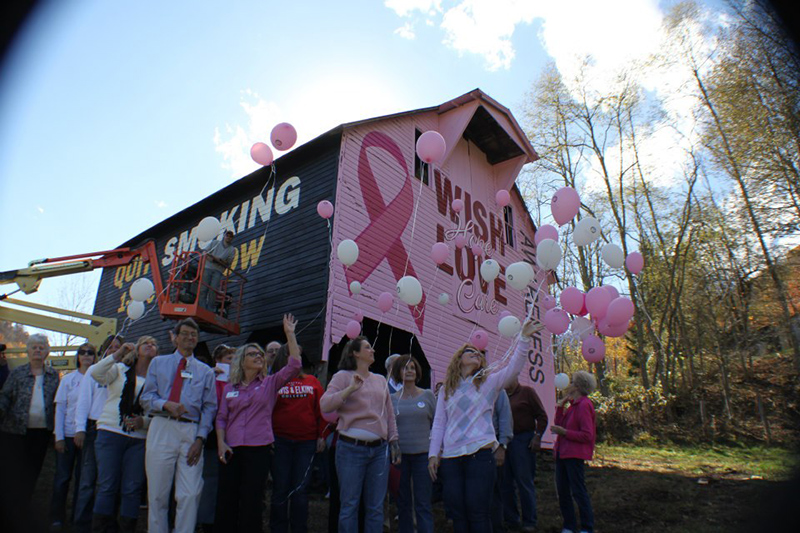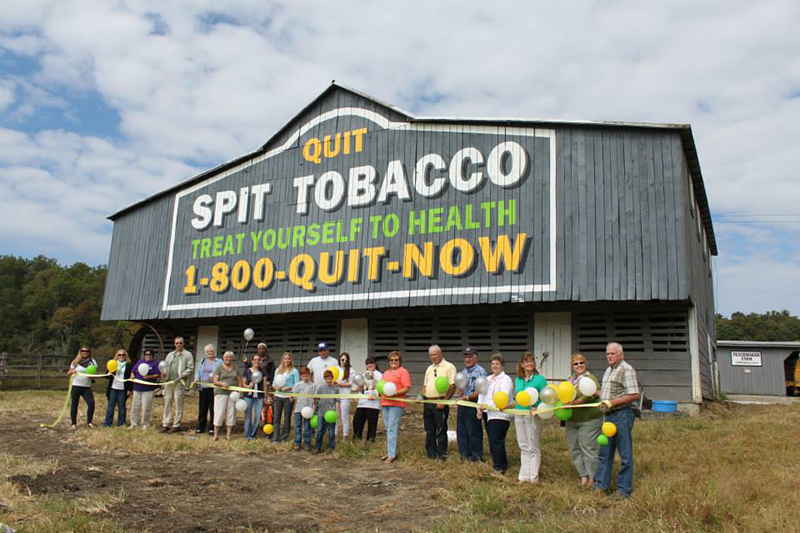Using Old Tobacco’s Tactics Against Them in a West Virginia Ad War
The classic Mail Pouch chewing tobacco ads on rural barns are being transformed into ads for public health.
Using Old Tobacco’s Tactics Against Them in a West Virginia Ad War
The classic Mail Pouch chewing tobacco ads on rural barns are being transformed into ads for public health.

Today, the aging barns enjoy a cult following of nostalgic “barnstormers” who travel the country cataloguing these fading relics of an earlier time. One of these devoted fans of the Mail Pouch barns is a West Virginian named Greg Puckett, who, by day, happens to be the director of Community Connections, a nonprofit substance abuse prevention organization in Princeton, W.Va.

“As a communications guy, I just found that to be a phenomenal campaign,” said Puckett.
He started brainstorming about ways of pairing the old Mail Pouch aesthetic with anti-tobacco message, and after months of pestering the state’s Division of Tobacco Prevention, Puckett finally wrangled a grant in 2009. It funded what he believes to be the country’s first barn advertisement for quitting chewing tobacco, in Monroe County, W.Va.

It went over well, and in the years since, Puckett’s organization has painted one or two barns each year in different parts of the state. Most include the slogan “Treat Yourself to Health” ”“ a riff on Mail Pouch’s exhortation to “Treat Yourself to the Best” ”“ and a phone number for the state’s tobacco quitline. More recently, they’ve done two pink breast cancer-awareness barns.
‘If I could just save my two kids from chewing the daggone stuff, hopefully some other parents will take notice.’
The latest barn to join the anti-tobacco collection is the largest one yet, perfectly situated for visibility along a highway in Hampshire County, W.Va., and completed in the fall of 2013. When approached by Community Connections, owner Pete Peacemaker was happy to support the cause. Peacemaker has chewed tobacco since he was a boy, and, after multiple attempts to quit, is eager to keep his own twin boys and their peers from ever starting.
“If I could just save my two kids from chewing the daggone stuff, hopefully some other parents will take notice,” said Peacemaker, who recently fell off the wagon after a two-year period when he thought he’d finally licked the habit. “I know a lot of teenagers chew that stuff.”
All of the anti-tobacco barns in West Virginia have been painted by Scott Hagan, who bills himself The Barn Artist. Hagan grew up in Ohio and got his start by painting his dad’s barn in homage to the Ohio State Buckeyes. Soon thereafter, as his barn painting career began taking off, he sought advice from an elderly man who lived nearby named Harley Warrick, who painted or re-painted more than 20,000 Mail Pouch barns between 1946 and 1991. Warrick, who died in 2000, bequeathed Hagan some painting wisdom along with some old equipment, which Hagan continues to use today.

Hagan himself has re-painted about a dozen Mail Pouch barns, and isn’t too ideological about the specifics of his barn commissions. He doesn’t use tobacco, and says his worst habit is sweet tea.
“I think it’s a good program. It’s a good way to get the message out,” he said, on his work with Puckett on the anti-tobacco barns. “[But] to me, Mail Pouch is … iconic. It’s a historical landmark.”
Puckett agrees, seeing a place for his contemporary public health message alongside historical preservation on barns across the Mountain State. This fall, he’s having Hagan paint one or two more anti-tobacco barns, bringing the total up close to 10, and plans to keep doing more and more.

The state’s aging collection of Mail Pouch barns are headed in the opposite direction, fading, peeling and falling down. Last year, four were lost, says Puckett, who may be the only anti-tobacco crusader around who’s concerned about disappearing tobacco advertising.
“I don’t want to lose the Mail Pouch barns either,” he said. “Even though I don’t believe in the message, I believe that they’re culturally significant to the state of West Virginia.”
Follow us

This work is licensed under a Creative Commons Attribution-NoDerivatives 4.0 International License.
Want to republish a Modern Farmer story?
We are happy for Modern Farmer stories to be shared, and encourage you to republish our articles for your audience. When doing so, we ask that you follow these guidelines:
Please credit us and our writers
For the author byline, please use “Author Name, Modern Farmer.” At the top of our stories, if on the web, please include this text and link: “This story was originally published by Modern Farmer.”
Please make sure to include a link back to either our home page or the article URL.
At the bottom of the story, please include the following text:
“Modern Farmer is a nonprofit initiative dedicated to raising awareness and catalyzing action at the intersection of food, agriculture, and society. Read more at <link>Modern Farmer</link>.”
Use our widget
We’d like to be able to track our stories, so we ask that if you republish our content, you do so using our widget (located on the left hand side of the article). The HTML code has a built-in tracker that tells us the data and domain where the story was published, as well as view counts.
Check the image requirements
It’s your responsibility to confirm you're licensed to republish images in our articles. Some images, such as those from commercial providers, don't allow their images to be republished without permission or payment. Copyright terms are generally listed in the image caption and attribution. You are welcome to omit our images or substitute with your own. Charts and interactive graphics follow the same rules.
Don’t change too much. Or, ask us first.
Articles must be republished in their entirety. It’s okay to change references to time (“today” to “yesterday”) or location (“Iowa City, IA” to “here”). But please keep everything else the same.
If you feel strongly that a more material edit needs to be made, get in touch with us at [email protected]. We’re happy to discuss it with the original author, but we must have prior approval for changes before publication.
Special cases
Extracts. You may run the first few lines or paragraphs of the article and then say: “Read the full article at Modern Farmer” with a link back to the original article.
Quotes. You may quote authors provided you include a link back to the article URL.
Translations. These require writer approval. To inquire about translation of a Modern Farmer article, contact us at [email protected]
Signed consent / copyright release forms. These are not required, provided you are following these guidelines.
Print. Articles can be republished in print under these same rules, with the exception that you do not need to include the links.
Tag us
When sharing the story on social media, please tag us using the following: - Twitter (@ModFarm) - Facebook (@ModernFarmerMedia) - Instagram (@modfarm)
Use our content respectfully
Modern Farmer is a nonprofit and as such we share our content for free and in good faith in order to reach new audiences. Respectfully,
No selling ads against our stories. It’s okay to put our stories on pages with ads.
Don’t republish our material wholesale, or automatically; you need to select stories to be republished individually.
You have no rights to sell, license, syndicate, or otherwise represent yourself as the authorized owner of our material to any third parties. This means that you cannot actively publish or submit our work for syndication to third party platforms or apps like Apple News or Google News. We understand that publishers cannot fully control when certain third parties automatically summarize or crawl content from publishers’ own sites.
Keep in touch
We want to hear from you if you love Modern Farmer content, have a collaboration idea, or anything else to share. As a nonprofit outlet, we work in service of our community and are always open to comments, feedback, and ideas. Contact us at [email protected].by Andrew Jenner, Modern Farmer
July 9, 2014
Modern Farmer Weekly
Solutions Hub
Innovations, ideas and inspiration. Actionable solutions for a resilient food system.
ExploreExplore other topics
Share With Us
We want to hear from Modern Farmer readers who have thoughtful commentary, actionable solutions, or helpful ideas to share.
SubmitNecessary cookies are absolutely essential for the website to function properly. This category only includes cookies that ensures basic functionalities and security features of the website. These cookies do not store any personal information.
Any cookies that may not be particularly necessary for the website to function and are used specifically to collect user personal data via analytics, ads, other embedded contents are termed as non-necessary cookies.